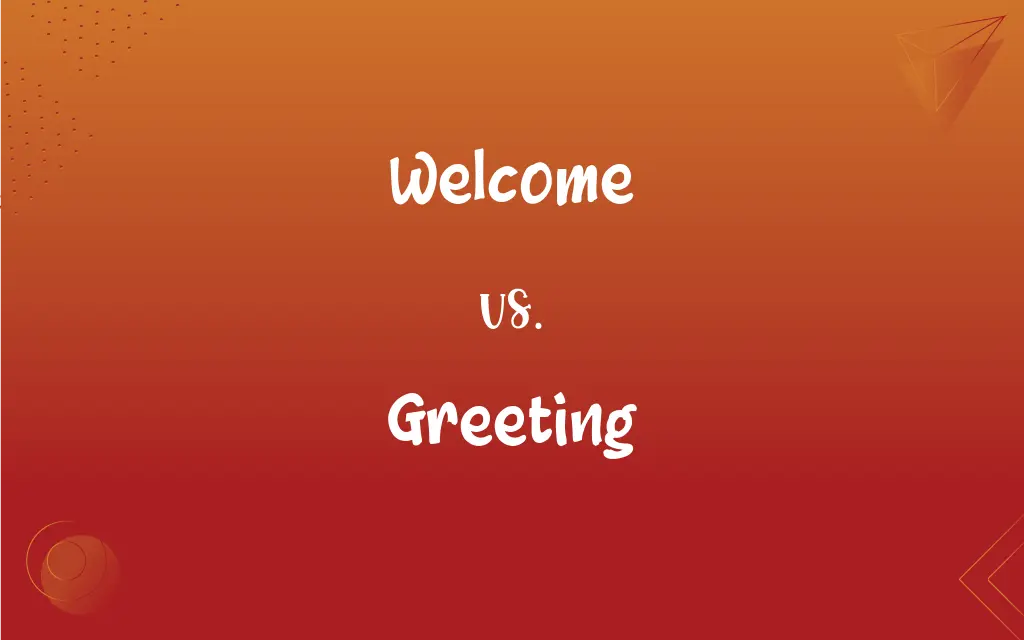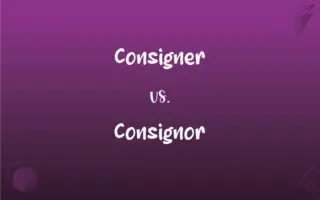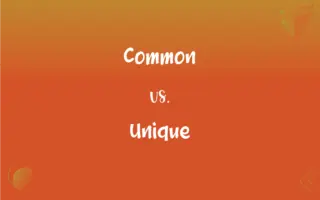Welcome vs. Greeting: What's the Difference?
Edited by Janet White || By Harlon Moss || Updated on November 7, 2023
"Welcome" is an expression of hospitality or reception, while "greeting" is a general way of acknowledging someone’s presence.

Key Differences
A welcome is specifically an expression of warmth and reception when someone arrives, while a greeting can be a simple acknowledgment, irrespective of arrival or presence.
Welcomes are often more personal and heartwarming, showing that someone’s presence is appreciated; greetings can be formal or informal, used in any encounter with another person.
When you welcome someone, it often implies that you are glad they are visiting your place or joining an event; a greeting is more about recognizing someone's presence, which doesn't necessarily imply you're hosting them.
Welcomes can set the tone for a visit or stay, indicating that guests are invited to feel at home; greetings serve as an initial interaction that may not carry any further implication of hospitality.
A welcome might involve a gesture, such as a welcome sign or a drink, to make someone feel at home; a greeting could be as simple as a nod, a handshake, or a verbal salutation.
ADVERTISEMENT
Comparison Chart
Definition
An expression of hospitality upon arrival
A standard acknowledgment of someone’s presence
Usage
Used when someone arrives at a place
Used upon meeting or seeing someone
Connotation
Implies warmth, reception, and invitation
Neutral, can be formal or informal
Accompaniment
Can include gestures like hugs, drinks
Usually involves verbal salutations, handshakes
Context
Often personal and heartfelt
Can be used in both personal and impersonal contexts
ADVERTISEMENT
Welcome and Greeting Definitions
Welcome
Welcome is used to greet someone arriving.
You're welcome to join us for dinner tonight.
Greeting
A greeting is a form of communication indicating presence.
His greeting, a simple nod, was returned with a smile.
Welcome
Welcome can express acceptance or approval.
Her ideas were welcome at the brainstorming session.
Greeting
Greeting refers to words or actions used when you meet someone.
He offered a cheerful greeting to every passerby.
Welcome
Welcome can be used to indicate permitted or invited.
Photographs are welcome at the event.
Greeting
Greeting is an expression of salutation or goodwill.
She sent a warm greeting to her colleagues every morning.
Welcome
Welcome means received gladly into one's presence.
The cool breeze was a welcome relief from the heat.
Greeting
Greeting can be a message of regards.
She included a personal greeting in each book she signed.
Welcome
Welcome signifies offering friendly reception.
The new policy was welcome news to the employees.
Greeting
Greeting is the action of addressing someone with specified words.
The official greeting at the ceremony was formal and respectful.
Welcome
Received with pleasure and hospitality into one's company or home
A welcome guest.
Greeting
A word or gesture of welcome or salutation.
Welcome
Giving pleasure or satisfaction; agreeable or gratifying
A welcome respite from hard work.
Greeting
A conventional phrase used to start a letter or conversation or otherwise to acknowledge a person's arrival or presence.
It's polite to begin a letter with a greeting, but this practice is less common in email.
Greeting
(uncountable) The action of the verb to greet.
Greeting
Present participle of greet
Greeting
Expression of kindness or joy; salutation at meeting; a compliment from one absent.
Write to him . . . gentle adieus and greetings.
Greeting
(usually plural) an acknowledgment or expression of good will (especially on meeting)
FAQs
Can "welcome" be used as a verb?
Yes, "welcome" can be used as a verb meaning to greet with pleasure.
Can a greeting be informal?
Yes, greetings range from informal to formal.
What is a welcome gesture?
A welcome gesture is an act that shows pleasure at someone's arrival.
Is "You're welcome" a response to thanks?
Yes, it's a polite response to someone who has thanked you.
What is a common verbal greeting?
"Hello," "Hi," or "Good [time of day]" are common verbal greetings.
Does "welcome" imply longer interaction?
Often, as it usually refers to someone being invited to stay or participate.
Is a greeting always spoken?
No, greetings can be spoken, written, or conveyed through gestures.
Can a welcome be too enthusiastic?
It's possible, depending on cultural norms and personal boundaries.
What is an unwelcome?
It refers to a not wanted or received with pleasure situation.
Are greetings culture-specific?
Yes, greetings vary widely across different cultures.
Can "welcome" be a noun?
Yes, it can be a noun signifying the greeting given upon someone's arrival.
Can "welcome" be an adjective?
Yes, as in "welcome news," where it describes something received with gladness.
Is "greetings" outdated?
While less common in casual conversation, "greetings" is still used, especially in formal contexts or written communication.
How can a place be welcoming?
Through a pleasant atmosphere and friendly attitude.
How important are greetings in communication?
Very, as they are the first step in social or professional interactions.
Do greetings need to be reciprocated?
Typically, yes, to acknowledge the other person's presence.
What's an example of a non-verbal greeting?
A wave, smile, or bow can be a non-verbal greeting.
What's the significance of greetings in business?
They are crucial for setting a professional tone and building rapport.
What does a welcome party involve?
A gathering to celebrate someone's arrival.
Can greetings be used to end a conversation?
Generally, greetings start a conversation, but similar phrases can be used to end one, like "goodbye."
About Author
Written by
Harlon MossHarlon is a seasoned quality moderator and accomplished content writer for Difference Wiki. An alumnus of the prestigious University of California, he earned his degree in Computer Science. Leveraging his academic background, Harlon brings a meticulous and informed perspective to his work, ensuring content accuracy and excellence.
Edited by
Janet WhiteJanet White has been an esteemed writer and blogger for Difference Wiki. Holding a Master's degree in Science and Medical Journalism from the prestigious Boston University, she has consistently demonstrated her expertise and passion for her field. When she's not immersed in her work, Janet relishes her time exercising, delving into a good book, and cherishing moments with friends and family.































































